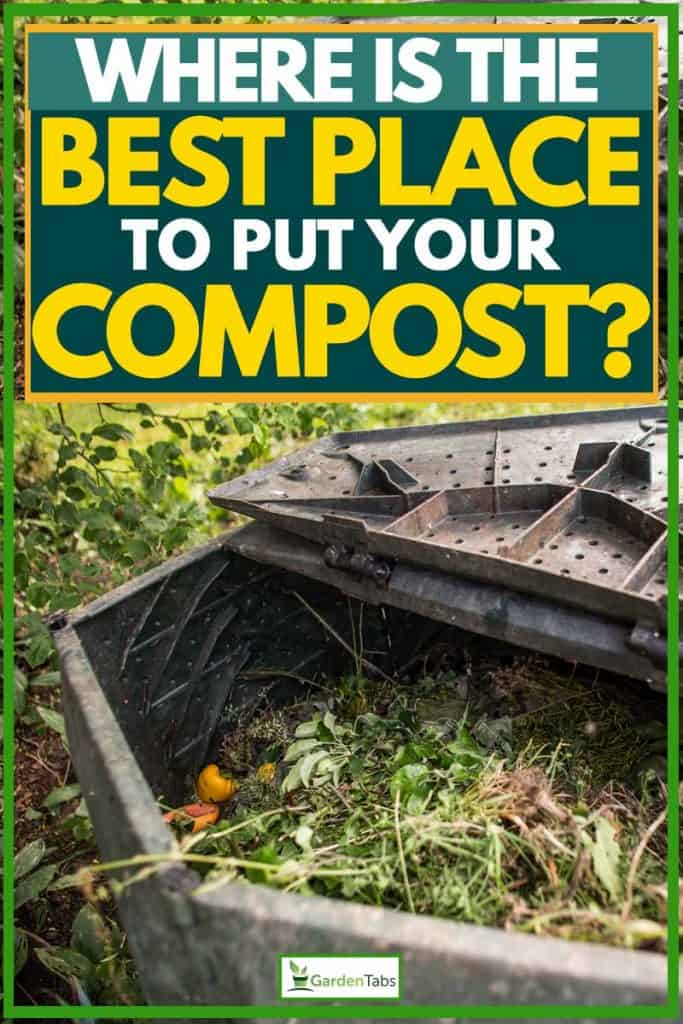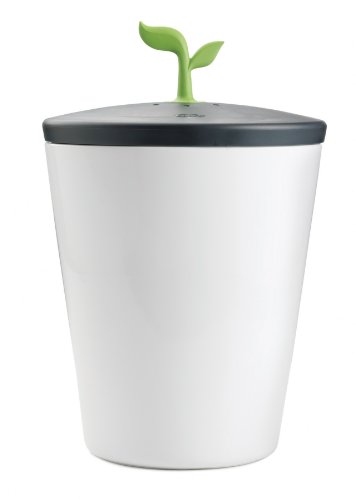 Composting is without a doubt a great way to help both your garden and the planet. But as you make plans to start this new endeavor, you may be wondering "Where is the best place to put my compost?" To answer this question, we've collected information from across the internet about the best location for your compost in a variety of situations.
Composting is without a doubt a great way to help both your garden and the planet. But as you make plans to start this new endeavor, you may be wondering "Where is the best place to put my compost?" To answer this question, we've collected information from across the internet about the best location for your compost in a variety of situations.
When selecting a spot for an outdoor compost bin, you'll generally want to find a place that is sunny, well-ventilated, and not too close to buildings. For indoor compost bins, the main concern is convenience, so you might want to put your bin under the kitchen sink or on the counter. Don't worry about your compost smelling bad - if everything is working the way it should, it will just smell like fresh soil.
Of course, these guidelines can change in different scenarios, but don't worry - we've covered all of the most common ones in this article. Additionally, we'll recommend a variety of compost bins that suit many different needs. Just keep reading and we'll answer all of your questions!
Should Compost Be In Sun Or Shade?
Whether your compost should be in the sun or in shade depends on how quickly you'd like the decomposition process to happen. Extra heat helps the organic matter break down rapidly, while the cool temperatures found in the shade slow the process down.
For most people, having a compost bin in a sunny spot works the best. That way, your kitchen scraps, dead leaves, and grass clippings are guaranteed to quickly transform into nutrient-rich compost. Just be aware that you'll need to moisten it more often, particularly if you live in a warm, sunny climate.
According to the Cornell Waste Management Institute, compost works best when it is at 40% to 60% moisture. Simply spray it lightly with your garden hose whenever you notice that the outer layers are drying out.
Cedar Composter
Click here to see more on Amazon.
However, compost tumblers should not be placed in direct sunlight. Since they're typically made from black plastic, they absorb a lot of heat. Even though compost needs heat to decompose properly, too much heat can dry the materials out, kill off the beneficial microbes, and stop the process completely. These composters work best in partial sunlight so the composting process can happen quickly without overheating.
Indoor compost bins should be placed in a dark location. Since your home is already warm, the compost will overheat much too quickly if it's in direct or even partial sunlight. If your indoor compost bin overheats too much, remove the lid, stir it up with a garden trowel, and let it cool off in a dark location.
How Far From The House Should Compost Be Placed?
If your compost has a lot of kitchen scraps, you'll probably want to put it at least 10' to 12' away from your house to avoid luring critters such as raccoons, squirrels, and mice too close to your home. However, if you're mostly composting yard waste such as leaves and grass clippings, you can put it as near to your house as you'd like with just a few caveats.
Don't be too concerned about the smell getting into your house. When done correctly, compost should have an earthy smell similar to the soil in a garden or forest. If it starts smelling like ammonia or any other unpleasant scent, you'll need to adjust the levels of heat, moisture, and oxygen to make sure everything is decomposing properly.
Moistening it less and turning it more with a shovel or pitchfork can help. According to the Green Action Centre, you can also make sure that you have about two to three times as much "browns" (leaves, paper, sticks) as "greens" (grass, vegetables, fruit) since too much green material is another common cause of bad odors.
Even if your compost is near the house, you'll want to keep it at least 12" to 18" away from the foundation. This allows for proper airflow and also helps minimize the chances 0f the compost's moisture attracting termites that could damage your house. Since oxygen is necessary for transforming scraps into compost, sufficient airflow is crucial.
Outdoor Tumbling Composter
If you have a compost tumbler, it's secure enough that it can be set up as close to the house as you would like. Compost tumblers are completely enclosed, which makes it almost impossible for animals to get in. Check out our article How Long Does it Take to Compost in a Tumbler to learn more about using compost tumblers.
Click here to see more on Amazon.
Where Should I Place A Compost Bin In The Kitchen?
When you're searching for the perfect spot to keep your kitchen compost bin, the possibilities are endless! Many people are hesitant to have a compost bin in their home due to concerns about bad odors, but if your compost bin has a tightly-fitting lid, you won't have to worry about smells leaking into your kitchen. The most important thing is finding a location that makes the bin easy to use. Here are just a few ideas to get you started:
Under-Counter Kitchen Composter
Store the bin under the kitchen sink for easy access and to cut down on odor. Some available bins even attach to the cabinet door and automatically pull the lid off with a chain for a hands-free experience. Under the kitchen sink is also a perfect spot to keep a worm composter, since it's quiet, dark, and secure. You can learn more about composting with worms in our article Can I Put Worms in My Compost Tumbler?
Click here to see more on Amazon.
Clear Plastic Compost Bin
If you have a deep drawer, that's the perfect spot for a bin to be tucked away. You could even line the drawer with plastic or metal inserts to transform the entire thing into a bin. To empty the compost or just clean the bin, simply remove the insert.
Click here to see more on Amazon.
Counter Compost Bin
If there are only one or two people in your household or you just don't have a lot of scraps, you could put a small compost bin on your counter. Find one that matches your decor, and no one will even give it a second thought. It's also the perfect size to give you a constant stream of nutritious compost for your houseplants.
Click here to see more on Amazon.
Hanging Scrap Collector
Find a small compost bin or garbage can that attaches to the end of your counter. Although you'll want another bin or pile to actually compost the scraps, this is a convenient way to collect them if you cook a lot. For added convenience, this example even collapses against the counter when not in use.
Or, if you have the option, install a compost bin that is flush-mounted to your counter or island and sits below it. This makes cleanup after cutting up fruits or vegetables super easy - just open the bin's lid and sweep the scraps inside! These bins are designed to easily detach from the counter so you can empty them when they get full.






